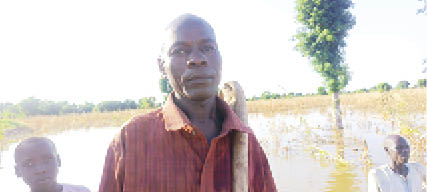Borno rice farmers in distress as floods ravage crops
The overflow of Alau Dam into Maiduguri and other parts of Borno State has pushed farmers into distress as hundreds of farmlands were submerged by the flood waters. The flooding has caused widespread damage to crops, as well as agricultural fields which millions of people cultivate every year to make a living. The affected farmlands […]

cover daily 1
The overflow of Alau Dam into Maiduguri and other parts of Borno State has pushed farmers into distress as hundreds of farmlands were submerged by the flood waters.
The flooding has caused widespread damage to crops, as well as agricultural fields which millions of people cultivate every year to make a living.
The affected farmlands submerged by the flood cut across Maiduguri, Jere and Mafa local government councils. The flood destroyed thousands of hectares of rice farms, including other crops.
In all the communities visited, Daily Trust observed that crops were either washed away or were getting rotten from being waterlogged by the flooding.
- Hardship: Tinubu orders low-key 64th independence celebration
- Niger boat mishaps claim 182 lives in 3yrs
In Zabarmari, one of the most reliable rice hubs in the North East region, paddies that produced the larger chunk of rice consumed in Borno and Yobe states were all waterlogged.
Zabarmari farmers are facing a second tragedy in two years. In November 2020, 76 Zabarmari rice farmers were slaughtered by Boko Haram terrorists in their fields in Koshebe, an incident that attracted global media attention.
One of the rice farmers, Kodori Bukar, told Daily Trust that the devastating flood struck when they were about to begin harvest.
“All the money I invested on seeds, fertiliser and labour to cultivate this land have been lost. The flood washed away everything, and, that is the condition of every farmer in this village,” he said
Another farmer, Baba Goni, who was also badly shaken by the flood disaster, said the damage caused to rice fields was very huge, adding that no family in Jere rice bowl is unaffected.
“It came within one day and took away everything. Not even other crops like corn, millet and beans that we cultivated on the highland were spared. You can see that our rice paddies are still waterlogged,” he lamented.
In Gogulam farming community, an adjoining village to Zabarmari, farmers were also counting their losses.
One of the farmers said he did not know what to do because his farm is still inundated. “Water has accumulated with lots of waste that must be cleared. We need help from the government to reactivate our farms, but our major fear now is feminine.”
The village head of Gogulam, Bulama Dupcha, regretted that the rice was fully grown and ready for harvest when the flood ravaged the community.
“In fact some farmers were to harvest their crops in one week’s time, when the flash flood devastated their farms.
“Many of these farmers have been left with nothing to eat, let alone getting any cash from our four months investment,” he said.
The member representing Jere Federal Constituency, Hon. Ahmed Satomi, who was also affected by the flood, told Daily Trust that, in the Jere rice bowl alone, thousands of hectares have been lost to the flood.
“The entire Jere water rice bowl, up to Koshebe and our border with Mafa Local Government Area, is above 50,000 hectares, which is close to 100 acres,” he said.
Satomi, nicknamed “the agrarian lawmaker” said the Jere rice bowl alone is about 22,000 hectares out of which, he lost over 2,000 hectares of rice paddy.
He said it was the flood water from Alau Dam, which has a reservoir capacity of 190 million cubic meters (190 billion litres) that washed away the thousands of farmlands, a disaster that will add to the nation’s food insecurity.
“It has taken away everything. So, we need intervention to help our people participate in dry season farming.
“You can see their effort after being called by the government to return to farm and be self-reliant. Suddenly, weeks to harvest, flood water takes away everything
Asked about his personal effort to help the situation, Satomi said, “The flood has taken over the cluster farming of Satomi integrated farms, and the community farming we are doing to the tune of about 2000 hectares but we are calling for intervention from the government.
“You can see their effort after being called upon by the government to return to the farm and be self-dependent. Suddenly, just weeks to harvest, the water takes away everything.
“Our soil is so fertile that with special intervention from the government, farmers would surely recover. His Excellency is aware, he sympathises with us and has promised to assist the farmers.
“The minister of agriculture is also aware. We are pleading with the government to intervene quickly to save the state from the shortfall in food supply that will compound food insecurity in the country,” he said.
Satomi also described what happened in Borno as a global catastrophe and prayed that it should not happen anywhere again.
“Nobody can quantify what is actually lost now, because apart from the capital infrastructure, commodities in the markets, shops and household items at home were all destroyed.
“I was told this morning that the water travelled up to Mafa and Dikwa, and we don’t know the havoc it will wreak there,” he added.
